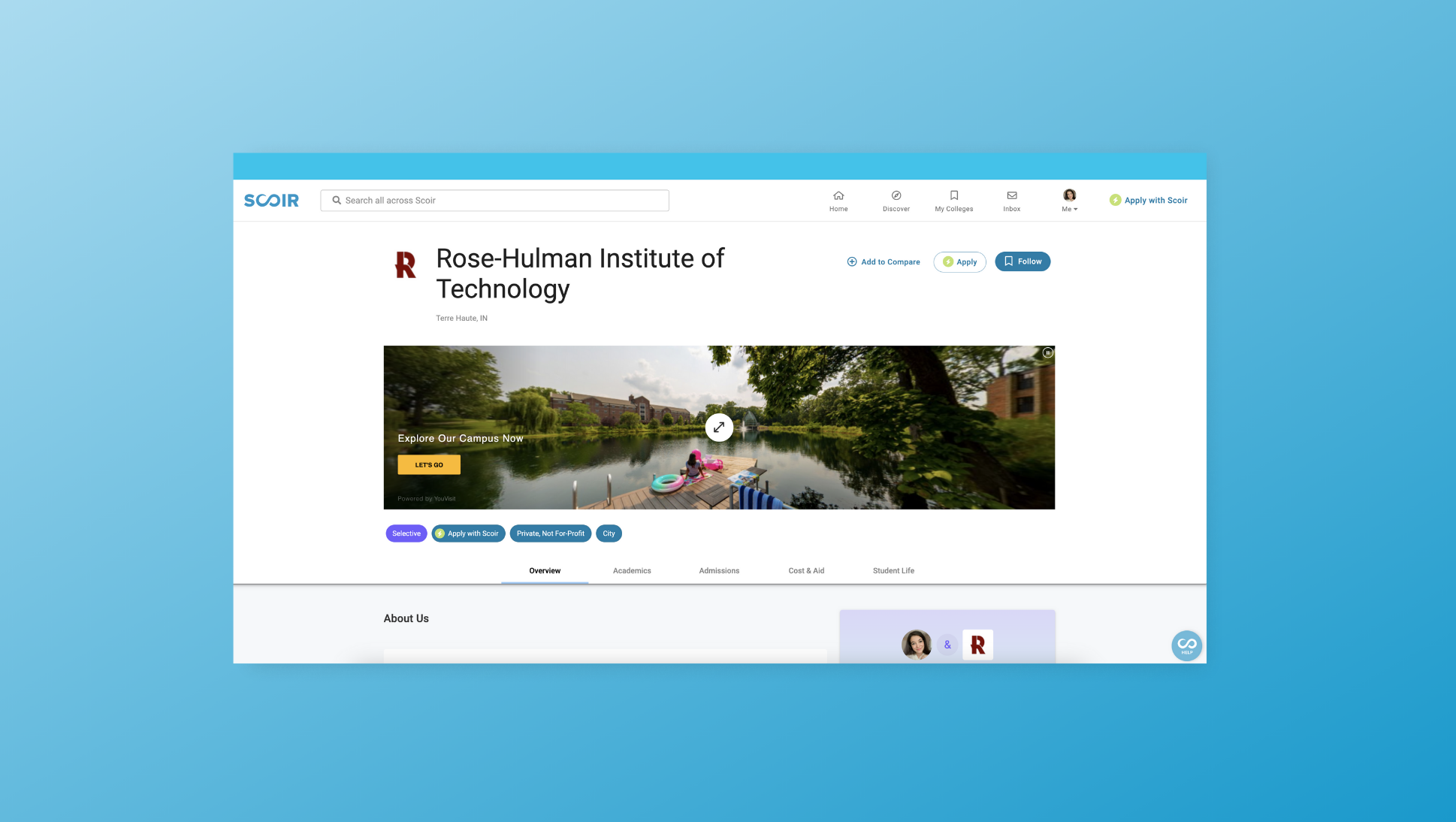4 min read
ACT and SAT Must-Knows for High Schoolers
We recently published a podcast episode on this topic. This blog post provides a recap of what we covered during the episode. Hi! It’s Abby from...
Free for students & their families
Seamlessly integrated, affordable systems for use across your district.
Career Readiness for 6-8 grade, built to guide and track progress in the early years of career exploration.
Scoir + Common App are integrated for the 2025-26 academic year!
Check out content and practical guides to help inform your enrollment strategies and programs.

Are you a strong swimmer or do you prefer to wade into shallow water where the bottom is visible and footing is certain? Most people expose themselves to water and swimming situations to their respective levels of skill and comfort—no more, no less. The same might be true as you assess your comfort level with different academic environments in search of a good college fit. Just as you study a body of water before venturing in, you need to investigate the rigor, pace, and depth of an academic environment before deciding to apply.
When searching and applying to a college, your objective should be to find an academic environment where you will be challenged and pushed to stretch yourself intellectually. After all, the purpose of continuing your education is just that—to continue to learn. You don’t want to place yourself in a college that does not challenge you enough academically, and conversely, you don’t want to be up against courses that are too challenging.
There are several factors that you should consider when trying to find your best-fit college. Before you continue reading this blog post, it may be a good idea to take a look at our blog post, How to Know if a College is Right for You: Finding Your Best Fit, and the webinar recording below which both address finding your best college fit.
Needless to say, academics is an especially important piece of finding your best college fit. Here are some tips to help guide you through the process.
Often, the best sources of insight regarding your academic success are your high school teachers. Their familiarity with your abilities can be invaluable in identifying a set of colleges where you will be well-served academically. Ask some of your favorite teachers if they have 10 minutes to spare to talk about college with you.
Once you have a cursory list of colleges you’d like to learn more about, the next thing to do is to assess the competitive landscape. How do your academic credentials line up against those who have been previously admitted? Most of this information can be found by viewing the college detail pages on Scoir. If your scores and GPA fall within the top quarter, it’s a safe bet you’ll be a competitive candidate for admission to that school. There are no guarantees, but it should offer you some reassurance.
When you explore colleges, be careful not to compromise on your passions. If you want to pursue film studies but a college you’re considering doesn’t offer a well-established program in that area, then it’s probably not a good fit. You owe it to yourself to look into colleges that offer substantive programs that meet your needs in your areas of interest.
Pursuing your interests and desired career may not require a degree from a 4-year college. 2-year, tech, and trade schools may be a great choice if you want to go into a trade, like welding. We'd recommend learning more about the different types of higher education so you know what your options are!
You should avoid embracing a college or university simply because:
When you prioritize emotional interests above academic ones, you are setting yourself up for frustration down the line. Think about it. How often do you hear about students transferring because the colleges they have chosen don’t offer the academic programs they want to study?
On the other hand, if you don’t feel drawn to a specific career path or academic direction, don’t worry. That is normal. You are normal. It’s difficult to know at any age what you’ll “do for the rest of your life,” so don’t stress about it. Don’t get hung up on what you don’t know. Instead, see this as an opportunity to explore underlying questions, such as:
Look for places that will encourage you to explore various perspectives and draw from diverse experiences. That will help to form the building blocks that are foundational to your future direction. Hundreds of colleges and universities across the country, liberal arts colleges as well as universities with robust general studies programs, are eager to embrace the undecided student. You just need to plan accordingly to give yourself options. If you are undecided about your future academic direction, yet find yourself looking at an application that requires you to declare a major as you apply, perhaps you are looking at an institution that isn’t right for you.
In the long run, it matters less where you go to college and more what you do with the opportunities available to you at that school. Focus on places that will embrace your interests and give you the best opportunity to succeed. Put yourself into a position where you fit best, and enjoy the success that is bound to come your way both as a candidate for admission and as a subsequently enrolled student. In doing so, you are setting yourself up to have the best chance of finding success on your chosen path!
If you're currently a student using Scoir to research colleges, you might want to check out this article on viewing scattergrams in Scoir. Scattergrams are a great way to understand historical application outcomes at colleges of interest. If you're a student not currently on Scoir, it's free to use and quick to sign up! We invite you to learn more about using Scoir as a student, and sign up for your free student account today using the button below. Once signed up, you can download our app for iOS and take your college search anywhere with you.
This article was originally published on June 17, 2020. It was updated on June 18, 2024 for accuracy and comprehensiveness.


4 min read
We recently published a podcast episode on this topic. This blog post provides a recap of what we covered during the episode. Hi! It’s Abby from...

6 min read
Gaining admission to the college(s) of your choice might weigh heavily on your mind at the moment. The odds are that the prospect of affording...

8 min read
The Free Application for Federal Student Aid (FAFSA), managed by the Department of Education, is the gateway to federal and state financial aid for...